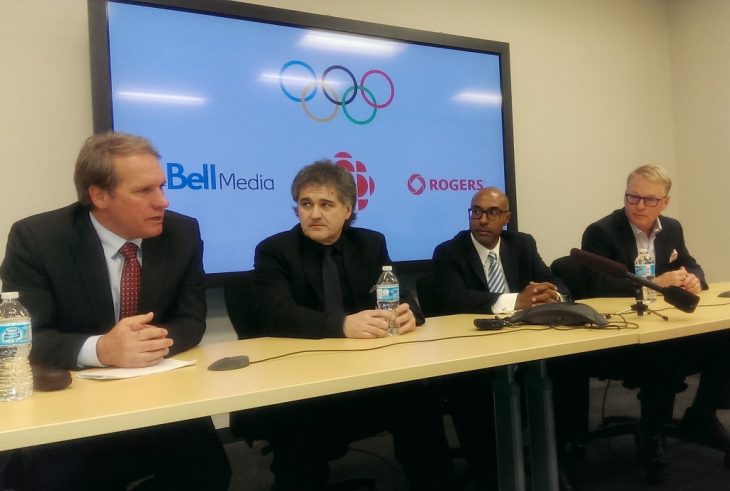
TORONTO – The CBC announced Wednesday it has purchased the broadcast and multiplatform rights to the 2018 Winter Olympics in PyeongChang Korea and the 2020 Summer Games in Tokyo. However, it won’t be working alone.
The public broadcaster also announced a broad partnership with both Bell Media and Rogers Media to bring “unprecedented” coverage of the Games to Canadians on all platforms.
While financial details of the rights purchase were not announced, the deal was termed an “extension” of the existing deal the CBC signed for the 2014 and 2016 Games. “We gave an offer to extend that was respectful of the stature of the Olympics but also fiscally responsible,” CBC Sports chief Jeffrey Orridge told media in a Toronto press conference Tuesday afternoon.
He declined to comment on whether the new deal came in higher, or lower than the estimated $80 to $90 million CBC paid for the ’14 and ’16 Olympics (which was a substantial cut from what the former CTVglobemedia paid for the 2010 and 2012 Games, estimated to be about $150-$160 million)
Given the scope of broadcasting – on multiple TV and digital platforms – something as challenging as the Olympic Games, Rogers Media president Keith Pelley; Orridge; CTV, sports, and entertainment programming president Phil King; and Radio-Canada sports head Francois Messier (left to right in the photo) were asked whether or not it’s now just impossible, from a fiscal and other resources point of view, for a single broadcaster to do the Olympics – and make a profit.
“Rather than (talk) monetization, this is what Canadians have come to expect,” said Pelley of an always-on, everywhere, Olympics. “You need this many platforms to be able to satisfy the actual consumer demand for the Olympics. We saw that change in 2010 with the (broadcast) consortium where 16 networks broadcast the games in 22 different languages. That became the standard of what Canadians wanted to experience the games and this is an extension beyond that.”
Pelley led that broadcast consortium (which was primarily Bell and Rogers, but with others such as APTN, too) bringing the 2010 and 2012 Games to Canadians.
“I don’t think it’s possible now for one broadcaster to be able to quench the thirst of what is needed as far as the consumer demand for Olympic broadcasting because there is so much happening and there are so many games and events that are happening at one time. You need this many broadcasters and this many platforms to be able to give consumers what they have come to expect,” explained Pelley.
“From our point of view, we probably had enough networks to go it alone at Bell Media, but you have to realize we have other programming commitments as well. So whether it’s CFL games… or Raptor games or Leafs games, it was pretty clear to us we had to have some kind of partnership,” added King.
“One company doing it alone… virtually impossible now.” – Phil King, Bell Media
But, “one company doing it alone… virtually impossible now,” he added. At worst, said Orridge, King and Pelley, the Games will break even.
While there is still much to be decided, CBC will get the “A-list” events, followed in order by TSN, Sportsnet, TSN2 and Sportsnet One, explained Orridge, who was credited with bringing the partnership together. CBC will offer updated apps as well, building on the huge success of its Sochi app.
While production will be shared among the three (“We all know the CBC sports department has been downsized somewhat and we’re happy to help the public broadcaster bring the games to Canada,” said King) CBC will be in charge of ad revenue.
“The deal is somewhat of a reversal of our NHL deal, where the CBC takes the lead in production and they sell the inventory on Sportsnet, which is a complete reversal of that which transpired with the NHL,” said Pelley. With the NHL deal, Rogers sells all of the advertising which airs on the CBC during NHL games.
Given the fact Rogers and Bell are the owners of nearly all the good sports rights available to Canadians and the CBC is struggling under government cuts and losing NHL hockey revenue, we asked whether or not the two companies felt any public or political pressure to play ball with the CBC.
“Honestly that didn’t really enter our mindset – we looked at it as a pure business opportunity,” said Pelley.
“CBC offered something that made sense for us. As a fan of the Olympics and sports, period, I think it’s great the CBC is involved. They do have a wide platform and if we try to do the Games ourselves and put it all on TSN or TSN2 and just RDS, there may be some people left out of that equation, so I do think it’s proper” that CBC lead this, added King.
“I think the Olympics are different. They’re different than everyday sport.”


